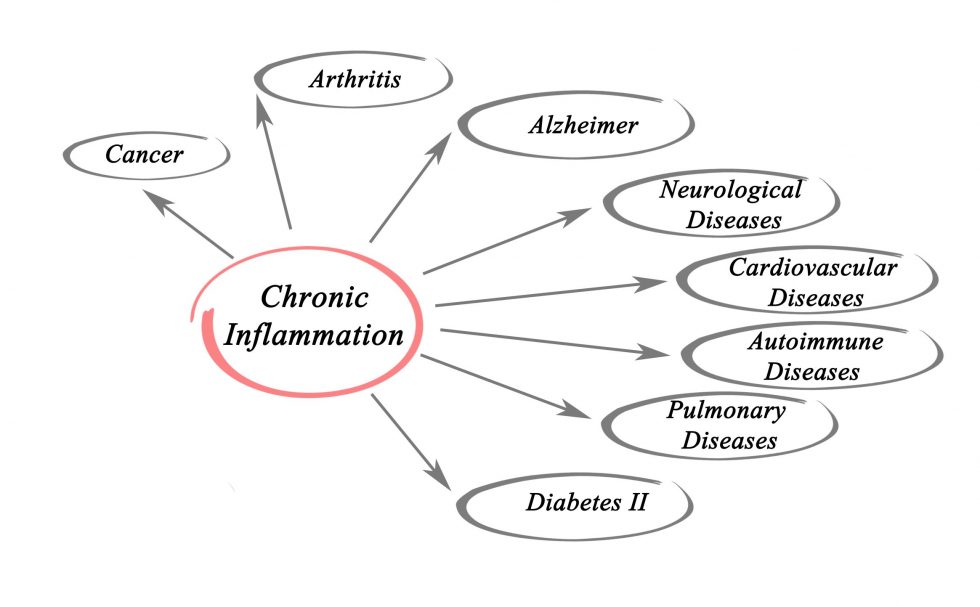Inflammation is at the core of most health issues. Unresolved, chronic inflammation is a feature of a wide range of chronic health conditions. If you suffer from any of the following you most likely have chronic inflammation in your body:
• Skin problems
• Painful, stiff or swollen joints
• Back pain
• Ankle swelling and pain
• Pain in hands and fingers
• Muscle pain and weakness
• Neck pain.
Some of more unexpected signs of chronic inflammation are:
– Hardening of the arteries (arteriosclerosis)
– Insulin resistance (the cells not utilizing insulin which leads to high blood sugar)
– Dry eye
– Brain issues
– Fatigue, or always being tired
– Balance problems.
Acute inflammation is a necessary, protective response of the body tissues to adverse stimuli, like irritants, or damaged cells due to injury. Acute inflammation lessens when the stimulus is removed.
In contrast, chronic inflammation is an ongoing response to stimuli that doesn’t end and the longer it continues the more it causes cellular degeneration and damage.
In fact, chronic inflammation is recognized as one of the four primary factors that affect health and cause degeneration in the body.
What can I do about chronic inflammation?
Dr. Robert Crea stated, “Tackling inflammation will be at the core of medicine for the next 20 years. Cellular inflammation, and trying to control it, is going to be at the core of medicine over the next 20 years and people want to manage it with natural compounds.”
The good news is that you can do something about chronic inflammation. Eating more plant-based whole foods will help. Taking whole food supplements designed to have a powerful, positive impact on inflammation will provide extra anti-inflammatory support.
What are Polyphenols?
Polyphenols are natural bioactive compounds, naturally present in fruit, vegetables and other plants, which are known for their anti-inflammatory, antioxidant and anti-bacterial properties.
As antioxidants, they can neutralize harmful free radicals that would otherwise damage your cells and tissues and increase the risk of conditions like cancer, diabetes, and heart disease.
Polyphenols can be categorized into 4 main groups:
• Flavonoids. Examples include quercetin, kaempferol, catechins, and anthocyanins, which are found in foods like apples, onions, dark chocolate, and red cabbage.
• Phenolic acids. Examples include stilbenes and lignans, which are mostly found in fruits, vegetables, whole grains, and seeds.
• Polyphenolic amides. This category includes capsaicinoids in chili peppers and avenanthramides in oats.
• Other polyphenols. This group includes resveratrol in red wine, ellagic acid in berries, curcumin in turmeric, and lignans in flax seeds, sesame seeds, and whole grains.
Olive Polyphenols' Results
One of the richest sources of polyphenols is olives. Hydroxytyrosol and oleuropein are polyphenols contained in olives.
The polyphenols in olives have a very high level of antioxidant (free radical scavenging) activity. In fact, Hydroxytyrosol has an ORAC value (Oxygen Radical Absorbance Capacity – its ability to absorb cell-damaging free radicals) of 68,576 – which is considered to be 15 times higher than green tea and 3 times greater than CoQ10. This means olive polyphenols are very effective in the fight against the damaging effects of free radicals on cells and body tissues, thereby reducing inflammation.
There are numerous studies supporting the benefits of olive oil and olive polyphenols. One such study is: “Beneficial effects of the olive oil phenolic
components oleuropein and hydroxytyrosol: focus on protection against cardiovascular and metabolic diseases.” Stefania Bulotta1, Marilena Celano1, Saverio Massimo Lepore1, Tiziana Montalcini2, Arturo Pujia2* and Diego Russo1* https://www.ncbi.nlm.nih.gov/pmc/articles/PMC4237885/
So, if you are suffering from problem skin conditions, joint issues, cardiovascular issues, or one of the many conditions that have inflammation as an underlying factor, take actions to reduce the chronic inflammation in your body to support your better health.

